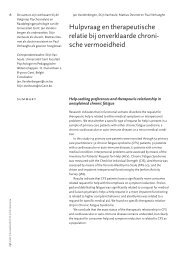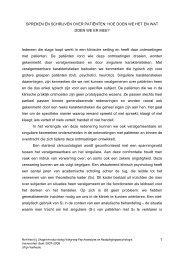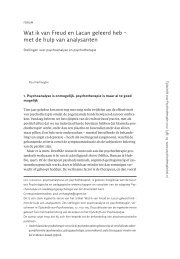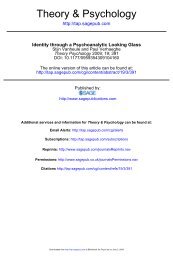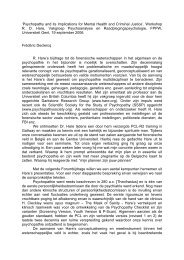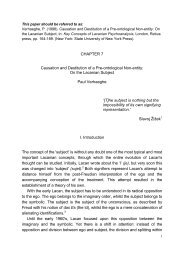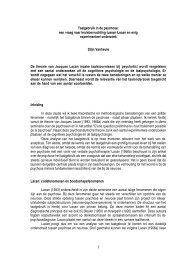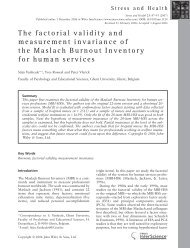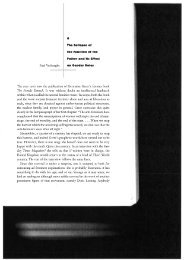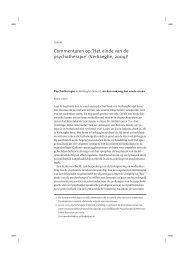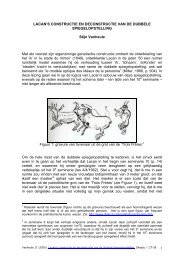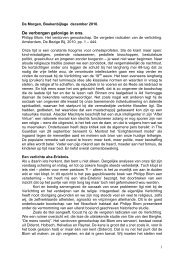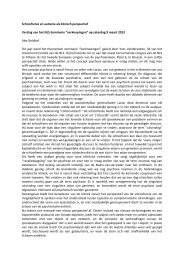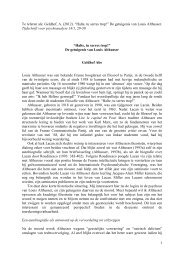psychotherapy and research
psychotherapy and research
psychotherapy and research
Create successful ePaper yourself
Turn your PDF publications into a flip-book with our unique Google optimized e-Paper software.
STIJN VANHEULE 105discussion. No definitive theory, no final definition of fundamental conceptscan be found in Lacan’s work. There is only work in progress (Miller 2007),<strong>and</strong> this is a very good attitude to foster when considering <strong>research</strong>. Lacan’sapproach to psychoanalysis is like Rimbaud’s attitude to love: it is somethingto be reinvented. Only upon this condition can it strike root (Vanheule,forthcoming). Exactly this critical attitude is to be cultivated when we thinkabout implementing <strong>research</strong> in clinical practice.There are many other ways of doing <strong>research</strong> in <strong>psychotherapy</strong> beyondthe RCT methodology; ways of <strong>research</strong> that do not mould <strong>psychotherapy</strong> tothe format of a manualized medical technique which, as I have tried todemonstrate, is inherently problematic. I advocate <strong>research</strong> that starts fromthe complexity of clinical practice, that focuses on therapeutic processes, thattakes a broader perspective on outcome, <strong>and</strong> that is guided by theoreticalideas (Hofmann & Weinberger 2007; Persons & Silberschatz 1998;Westen & Bradley 2005; Westen, Novotny & Thompson-Brenner 2004). Inthe UK, noteworthy examples of alternative forms of <strong>psychotherapy</strong><strong>research</strong> can be found in, for instance, work from people affiliated to theTavistock Clinic (e.g. Briggs et al. 2006) <strong>and</strong> to the Anna Freud Centre (e.g.Fonagy et al. 2002).If we want <strong>research</strong> to be relevant <strong>and</strong> ethical for our therapeutic practices,then we should take care that patients are not filtered out as is happeningwithin RCTs. Research designs should, on the contrary, be such thatthey fit the complexity of clinical practice. In this context, more attentioncould be paid to the use of single-case <strong>research</strong> (e.g. Allison, Franklin &Gorman 1997; Borckardt et al. 2008; Molloy, Murphy & King 2007) <strong>and</strong> tothe systematic use of clinical judgement (e.g. Goldfried & Eubanks-Carter2004; Pachankis & Goldfried 2007; Westen, Novotny & Thompson-Brenner2004) in the study of naturalistic patient samples. Researchers <strong>and</strong> cliniciansshould work together much more closely than is usually the case in designing,executing <strong>and</strong> publishing studies. Alliances of this type will guaranteethat <strong>research</strong> information is circulating more easily to clinical practice <strong>and</strong>that issues which clinically matter are scientifically studied. Furthermore, thesystematic study of unsuccessful treatments should be used more explicitlyto refine clinical work. All clinicians know about their own unsuccessfultreatments, yet very few of these treatments are examined in a systematicway, let alone published. Freud published a number of these cases <strong>and</strong>they proved to be informative for the development of psychoanalysis as adiscipline.More attention should also be paid to the process of successful <strong>and</strong> unsuccessfultherapies. Detailed inquiries about patients’ functioning, therapists’actions <strong>and</strong> the interaction between both are in this respect most relevant.An unsatisfying characteristic of RCT <strong>psychotherapy</strong> is that it treats <strong>psychotherapy</strong>itself rather as if it were a ‘black box’. Something is put into it: aperson with a disorder; <strong>and</strong> something comes out of it: a person, this time



